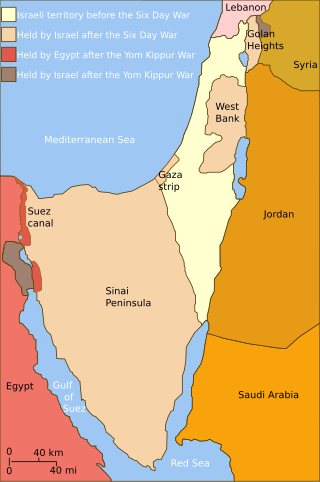
The member states of the United Nations comprise 193 sovereign states. The United Nations (UN) is the world's largest intergovernmental organization. All members have equal representation in the UN General Assembly.

United Nations Security Council Resolution 338 was a three-line resolution adopted by the UN Security Council on 22 October 1973, which called for a ceasefire in the Yom Kippur War in accordance with a joint proposal by the United States and the Soviet Union. It was passed at the 1747th Security Council meeting by 14 votes to none, with China abstaining.
United Nations Security Council Resolution 27 was adopted on 1 August 1947. The Council called for a ceasefire and a peaceful resolution between the parties from the Netherlands and Indonesia involved in the Indonesian National Revolution.
United Nations Security Council Resolution 30 was adopted by on 25 August 1947. The parties from the Netherlands and Indonesia involved in the Indonesian National Revolution agreed to comply with Resolution 27. The Council requested that each member recall a diplomatic officer from Batavia for briefings on the situation.
United Nations Security Council Resolution 31 was adopted on 25 August 1947. The Council formed a committee to assist in the peaceful resolution of the Indonesian National Revolution.
United Nations Security Council Resolution 32 was adopted by the United Nations Security Council on August 26, 1947. The Council formally reminded both sides of the Indonesian National Revolution to adhere to Resolution 27, which called for a ceasefire and peaceful resolution to the conflict.
United Nations Security Council Resolution 36, adopted on November 1, 1947, noted that according to a report by the Consular Commission, no attempt has been made by either side in the Indonesian National Revolution to come to compliance with United Nations Security Council Resolution 27. The resolution called upon the parties concerned to take action to bring the resolution into effect.
United Nations Security Council Resolution 40, adopted on February 28, 1948, requested that the Committee of Good Offices watch the political developments in western Java and Madura and to report their findings to the Council frequently.
United Nations Security Council Resolution 55, adopted on July 29, 1948, having receiving a report from the Committee of Good Offices about a standstill in political and trade negotiations in Indonesia, the Council called upon the governments of the Netherlands and the Republic of Indonesia to maintain strict observance of both the military and economic elements of the Renville Agreement and to implement early and fully its twelve political principles.
United Nations Security Council Resolution 63, adopted on December 24, 1948, in response to a report by the Committee of Good Offices the Council called upon the parties to cease hostilities and to release the President of the Republic of Indonesia and other political prisoners arrested since December 18, 1948.
United Nations Security Council Resolution 65, adopted on December 28, 1948, requested that the consular representatives in Batavia referred to in United Nations Security Council Resolution 30 send a complete report on the situation in the Republic of Indonesia, covering the observance of ceasefire orders and the conditions prevailing in areas under military occupation or from which armed forces now in occupation may be withdrawn.
United Nations Security Council Resolution 75 was adopted on 27 September 1949. After receiving a General Assembly resolution authorizing the Security Council to make decisions on the matter, the Council decided to retroactively reimburse the Member States that were participating in the United Nations Commission for Indonesia and the United Nations Commission for India and Pakistan for their travelling and subsistence expenses.
United Nations Security Council Resolution 76, adopted on October 5, 1949, after receiving a cablegram from the Consular Commission at Batavia to the President of the Security Council requesting that the United Nations assume future costs of military observers in Indonesia the Council transmitted the message to the Secretary-General.

UN Security Council Resolution 1803 was adopted on March 3, 2008, by a vote of 14-0-1, with Indonesia as the only abstention. The Security Council of the United Nations, acting pursuant to Article 41 of Chapter VII of the UN Charter, required Iran to cease and desist from any uranium enrichment. It also required Iran to stop research and development associated with centrifuges and uranium enrichment.

United Nations Security Council resolution 1410, adopted unanimously on 17 May 2002, after recalling previous resolutions on East Timor (Timor-Leste), particularly resolutions 1272 (1999), 1338 (2001) and 1392 (2002), the council established the United Nations Mission of Support to East Timor (UNMISET) to replace the United Nations Transitional Administration in East Timor (UNTAET).

United Nations Security Council resolution 1599, adopted unanimously on 28 April 2005, after reaffirming previous resolutions on East Timor (Timor-Leste), particularly resolutions 1543 (2004) and 1573 (2004), the council established the United Nations Office in Timor-Leste (UNOTIL) to follow on from the United Nations Mission of Support to East Timor (UNMISET) as a special political mission for one year until 20 May 2006.

The United Nations Supervision Mission in Syria (UNSMIS) was a United Nations peacekeeping mission in Syria, set up in 2012 as a result of United Nations Security Council Resolution 2043 in response to the Syrian Civil War. It was commanded by Norwegian Major General Robert Mood until 20 July 2012 followed by Lieutenant General Babacar Gaye from Senegal. Although observers remain in the country, Mood suspended their mission on June 16, 2012, citing "escalating violence". Observers will conduct no further patrols and stay in their current positions until the suspension is lifted. On 20 July 2012, the Security Council extended UNSMIS for a final period of 30 days. According to resolution 2059, the Council would only consider more extensions in the event that the Secretary-General reports and the Security Council confirms the cessation of the use of heavy weapons and a reduction in the level of violence sufficient by all sides to allow UNSMIS to implement its mandate.
Events in the year 1948 in Indonesia. The country had an estimated population of 72,979,300.





